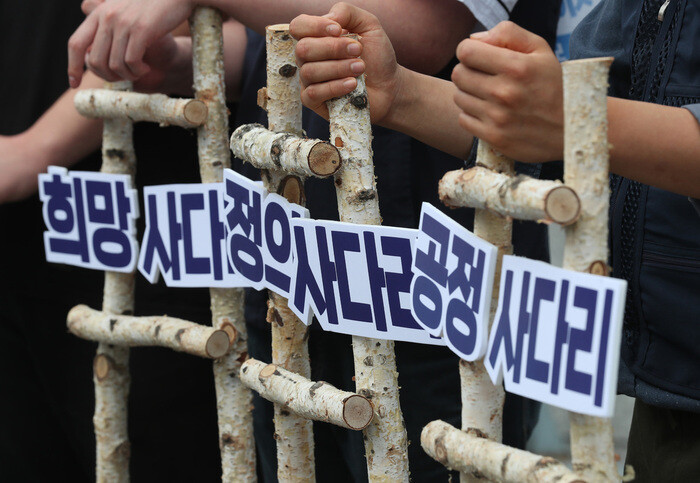hankyoreh
Links to other country sites 다른 나라 사이트 링크
[Editorial] S. Korea needs to listen to pay heed to the anger of young people over Cho Kuk

Even after Cho Kuk was officially appointed South Korea’s justice minister, the controversy over his nomination still sizzles. The uproar about school admissions of Cho’s daughter and related allegations have aroused feelings of rage and relative deprivation among the younger generation.
While the various allegations will no doubt be sorted out during the course of the ongoing investigation by the prosecutors, it will be much more challenging to answer young people when they ask whether this administration, and South Korean society today, are truly fair and just.
We would like to view Cho’s meeting with 10 young people on Sept. 11, his first public action as justice minister, as communicating his intention to listen humbly to the voices of the younger generation. Both the Moon administration and Cho himself are fully aware that the meeting must not be a throw-away gesture or a condescending move, as some worry.
The participants in this meeting included a graduate of a vocational high school, an irregular worker, a nursing home therapist, a friend of a man surnamed Kim who died while doing maintenance work at Guui Station, and the president of Youth Chun Tae-il, an NGO for young people that asked for a public meeting with Cho last month — all of whom count as young people from a disadvantaged background. Their meeting reportedly included a lot of plain talk about important social issues: a plan to dismantle the autonomous private high schools and special-purpose high schools that are regarded as schools for the privileged, questions about the fairness of the current university admission system, the need for fair hiring rules, measures to prevent the deaths of young workers, the minimum wage, and social discrimination against vocational high schools.
For the majority of young people, illegality itself may not be as desperate an issue as inequality within the framework of the law. This idea was expressed by a message that one young person sent to Youth Chun Tae-il: “This cut even deeper than law breaking by the usual dirty politicians. This felt even more hopeless.”
Chun Tae-il (Aug. 26, 1948 – Nov. 13, 1970) was a South Korean worker and workers' rights activist who committed suicide by burning himself to death at the age of 22 in protest of the poor working conditions in South Korean factories.
It would be hard to deny that in the debate over Cho’s nomination, this perspective received less attention than the question of whether or not any laws had been broken and the conflict between the two political camps. As the Hankyoreh reported in its Sept. 11 edition, the controversy over Cho’s daughter felt to many young people like “the story of a completely different world,” a disturbingly vivid illustration of the fact that “even envy is class-dependent.” It’s unfortunate that the candlelit rallies held at several universities were alternatively castigated and commended, depending on the political alignment of the commentator.
It’s fine to debate the virtues and vices of the 86 generation, but what’s beyond debate is that that generation has enjoyed more privileges than any other and that it currently occupies a dominant position in our political and economic systems. As such, if the 86 generation ignores this stinging criticism, solutions to our problems will grow even more remote. The South Korean government and political realm face a grave responsibility. We hope they will steadily implement policies that “build a fair ladder,” as young people said at the meeting, while focusing on the public, rather than the opposing side. That’s why South Koreans raised the candles three years ago.
Please direct comments or questions to [english@hani.co.kr]
Caption: Youth Chun Tae-il, an NGO for young people, hold a press conference ahead of their meeting with Justice Minister Cho Kuk at the Gwacheon Government Complex on Sept. 11. (Baek So-ha, staff photographer)

Editorial・opinion
![[Column] When ‘fairness’ means hate and violence [Column] When ‘fairness’ means hate and violence](https://flexible.img.hani.co.kr/flexible/normal/500/300/imgdb/original/2024/0516/7417158465908824.jpg) [Column] When ‘fairness’ means hate and violence
[Column] When ‘fairness’ means hate and violence![[Editorial] Yoon must stop abusing authority to shield himself from investigation [Editorial] Yoon must stop abusing authority to shield himself from investigation](https://flexible.img.hani.co.kr/flexible/normal/500/300/imgdb/original/2024/0516/4417158464854198.jpg) [Editorial] Yoon must stop abusing authority to shield himself from investigation
[Editorial] Yoon must stop abusing authority to shield himself from investigation- [Column] US troop withdrawal from Korea could be the Acheson Line all over
- [Column] How to win back readers who’ve turned to YouTube for news
- [Column] Welcome to the president’s pity party
- [Editorial] Korea must respond firmly to Japan’s attempt to usurp Line
- [Editorial] Transfers of prosecutors investigating Korea’s first lady send chilling message
- [Column] Will Seoul’s ties with Moscow really recover on their own?
- [Column] Samsung’s ‘lost decade’ and Lee Jae-yong’s mismatched chopsticks
- [Correspondent’s column] The real reason the US is worried about Chinese ‘overcapacity’
Most viewed articles
- 1China calls US tariffs ‘madness,’ warns of full-on trade conflict
- 2[Column] When ‘fairness’ means hate and violence
- 3[Column] US troop withdrawal from Korea could be the Acheson Line all over
- 4Could Korea’s Naver lose control of Line to Japan?
- 5[Editorial] Yoon must stop abusing authority to shield himself from investigation
- 6Naver’s union calls for action from government over possible Japanese buyout of Line
- 7[Column] Welcome to the president’s pity party
- 8[Column] How to win back readers who’ve turned to YouTube for news
- 9DongA Ilbo and the government are told to apologize for past civil rights violations
- 10S. Korea’s spy agency ramping up national security investigations to keep itself relevant, critics s